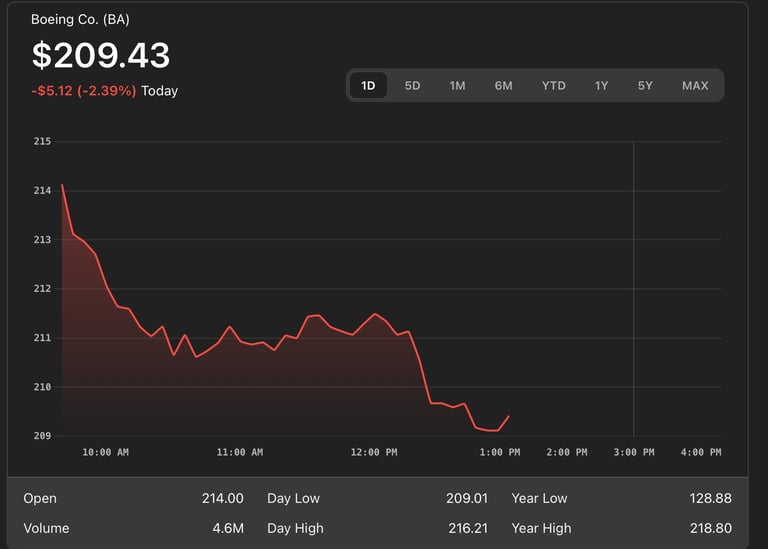🚀 Fitch Upgrades Boeing’s Outlook to “Stable” Amid Stronger Performance
Here’s an in-depth look at Fitch’s decision to improve Boeing’s credit outlook — a signal of strengthening financials and production momentum:
Kylo B
6/30/20252 min read
Here’s an in-depth look at Fitch’s decision to improve Boeing’s credit outlook — a signal of strengthening financials and production momentum:
🚀 Fitch Upgrades Boeing’s Outlook to “Stable” Amid Stronger Performance
June 30, 2025 – New York / Washington — Global ratings agency Fitch upgraded Boeing’s credit outlook from “negative” to “stable,” retaining its long-term issuer default rating (IDR) at BBB- . This move reflects significant improvements in Boeing's operational resilience and financial flexibility following a challenging period.
🔧 Key Drivers Behind the Upgrade
Resolution of Labor Strike
Fitch credited Boeing's recovery from a major labor strike involving 33,000 workers, which previously disrupted production of its flagship jets . Progress was already noted in March when Fitch reported early success resuming production and managing supply chain bottlenecks .
Ramp-Up in 737 MAX Production
The acceleration in assembly and delivery of 737 MAX aircraft is expected to drive improved free cash flow (FCF) and strengthen EBITDA leverage—keeping Boeing within investment-grade credit parameters .
Debt Reduction Strategy
Boeing plans to reduce gross debt below $50 billion by 2026, partly through repayment of $7.95 billion in maturing bonds, alongside the divestiture of non-core assets such as its Jeppesen flight navigation unit .
Strategic Asset Sales & Portfolio Optimization
Management’s focus on selling non-essential assets and reviewing its defense segment aligns with Fitch’s assessment that Boeing is sharpening its long-term capital allocation strategy .
📈 What It Means for Boeing
Access to Credit Markets
The shift from negative to stable outlook reassures lenders and investors, maintaining Boeing’s access to favorable borrowing conditions despite past disruptions.
Potential Rating Upgrade
Fitch suggested that, should Boeing sustain operational gains and clarify capital deployment plans, a future upgrade is possible within 6–12 months .
Peer Validation
S&P had removed Boeing from CreditWatch negative in April following improved production and reduced cash burn—indicating broader confidence in the company's turnaround .
🧭 Market & Industry Implications
Resuming Growth Momentum
Increased MAX deliveries will enhance Boeing’s top-line revenue, strengthen cash flow, and provide flexibility for potential share repurchases or strategic investments.
Competitive Positioning
A stable outlook aids Boeing in competing with Airbus and other global aerospace manufacturers, particularly in securing contracts and reassuring airline customers.
Defense Segment Watch
Continued focus on its defense arm—including divestitures or restructurings—may generate additional capital and sharpen Boeing’s commercial aviation focus.
📌 Summary
Fitch’s upgrade signals renewed investor confidence in Boeing’s recovery under CEO Kelly Ortberg. With strong production resurgence, disciplined debt management, and strategic divestitures, Boeing appears poised to stabilize cash flows and regain financial momentum. A sustained performance could even trigger a credit rating upgrade, marking a significant milestone in the company's path toward long-term resilience.
🔍 What to Watch Next
Q3 production volume targets and margins on 737 MAX builds
Progress in debt repayment and non-core asset sales
Any updates on defense portfolio strategy and execution
Boeing's financial housekeeping and operational rebound have won it a stable credit standing. As long as its recovery trajectory holds, the company may be well on the way to regaining its full investment-grade status.




